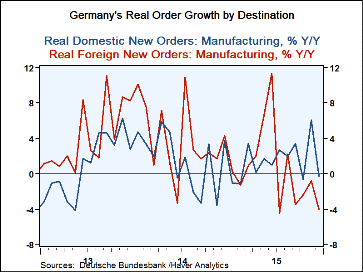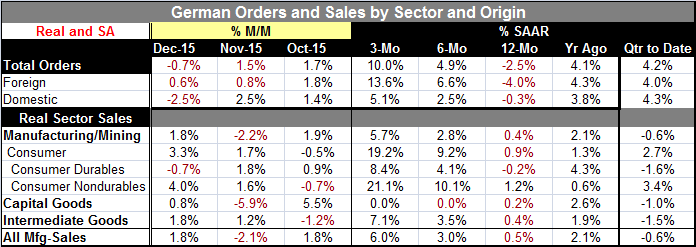 Global| Feb 05 2016
Global| Feb 05 2016German Orders Show Building Strength Despite December and Year-Over-Year Weakness
Summary
In December, total orders in Germany fell by 0.7%. Foreign orders rose for the third consecutive month after falling for three months in a row. Year-over-year foreign orders remain as the weaker of the two series. Domestic orders fell [...]
 In December, total orders in Germany fell by 0.7%. Foreign orders rose for the third consecutive month after falling for three months in a row. Year-over-year foreign orders remain as the weaker of the two series. Domestic orders fell sharply in December and are responsible for the drop in total orders. But domestic orders are up in two of the last three months and lower for the two months previous to that. Domestic orders are lower year-on-year by only 0.3%. In the quarter just completed, both foreign and domestic orders are up at a 4% pace or more. Despite the December total order drop, conditions in Germany seem quite firm.
In December, total orders in Germany fell by 0.7%. Foreign orders rose for the third consecutive month after falling for three months in a row. Year-over-year foreign orders remain as the weaker of the two series. Domestic orders fell sharply in December and are responsible for the drop in total orders. But domestic orders are up in two of the last three months and lower for the two months previous to that. Domestic orders are lower year-on-year by only 0.3%. In the quarter just completed, both foreign and domestic orders are up at a 4% pace or more. Despite the December total order drop, conditions in Germany seem quite firm.
While domestic order weakness dominates the report in December, that is an outlier on recent trends. We will want to see more data beyond December before concluding that the German domestic economy has really gotten that weak. As for the foreign sector, despite three months of gains and a clear accelerating trend, that pattern is not impressive against the reports of weak growth we see from other countries. German trends need to be sorted out and rationalized to be understood rather than just swallowed whole the way they are. The latest data and the last three month trends raise more questions than they answer. For example, the closely followed Ifo report was weakening on this period.
German real sector sales data confirm recent strength across sectors despite the December drop in domestic orders. Those two indicators seem out of sync, although we understand that sales are not orders and vice versa. German sales overall have been showing steady acceleration, making the December orders drop seem to be an artifact of the data or something related to yearend transactions. Sales by German consumer sectors have been strong over three months and steadily gaining momentum. The capital goods sector, however, the usual core of German strength, has gone dead flat with sales flat over three months and over six months and barely higher over 12 months. Recent capital goods orders fluctuated widely and offset one another before December's 0.8% gain. Intermediate goods show building momentum in sales, at 1.8%.
Taking this all in, the last year shows German sales data as strong and gaining momentum across categories except that investment goods, a traditional German stronghold, has gone flat. The strength in German real sector sales is echoed by firm domestic orders over three months and six months. Foreign orders are showing building momentum too, but with orders of all stripes net lower over 12 months. Among these trends, the foreign sector trends are the hardest to buy into because global economic trends, especially for manufacturing, remain so weak. But the pure strength in the domestic economy also is impressive and more than what we had been seeing in other reports. Recently, the German construction sector also posted some strong numbers. This makes me wonder if the support of migrants is providing economic stimulus in Germany. Their numbers are mounting along with the complaints.

Robert Brusca
AuthorMore in Author Profile »Robert A. Brusca is Chief Economist of Fact and Opinion Economics, a consulting firm he founded in Manhattan. He has been an economist on Wall Street for over 25 years. He has visited central banking and large institutional clients in over 30 countries in his career as an economist. Mr. Brusca was a Divisional Research Chief at the Federal Reserve Bank of NY (Chief of the International Financial markets Division), a Fed Watcher at Irving Trust and Chief Economist at Nikko Securities International. He is widely quoted and appears in various media. Mr. Brusca holds an MA and Ph.D. in economics from Michigan State University and a BA in Economics from the University of Michigan. His research pursues his strong interests in non aligned policy economics as well as international economics. FAO Economics’ research targets investors to assist them in making better investment decisions in stocks, bonds and in a variety of international assets. The company does not manage money and has no conflicts in giving economic advice.






